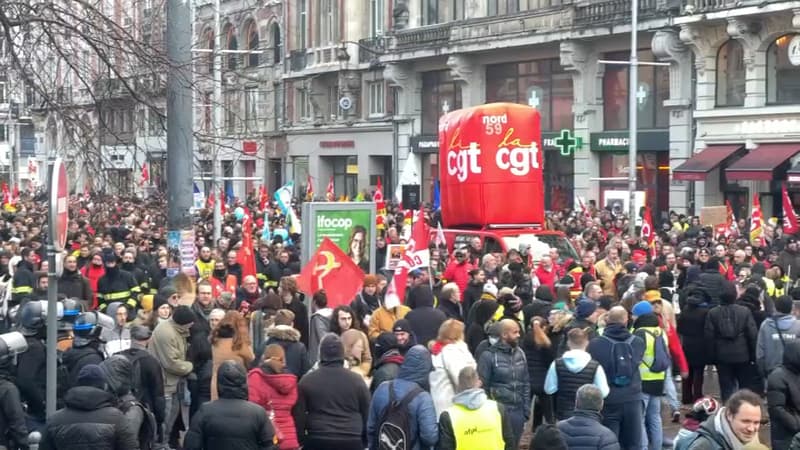Against the pension reform, the unions, always united, do not relax the pressure. The fifth day of national mobilization will take place this Thursday, February 16. In addition to demonstrations throughout France, riots are expected after several strike calls. Update on the situation.
• Demonstrations: the inter-union meets in Albi
In a joint press release, the inter-union (CFDT, CGT, FO, CFE/CGC, CFTC, Unsa, Solidaires, etc.) announces that “the general secretaries or presidents of the trade union organizations will demonstrate in Albi to support the strong anchoring of this movement throughout the territory, both in small towns and in larger ones”. It remains to be seen if the popular mobilization will continue, while two areas are currently under license.
• SNCF/RATP: strikes but fewer interruptions
The railway workers of the CGT, UNSA-Ferroviaire, SUD Rail and CFDT Cheminots have called the SNCF workers to strike but the mobilization will be less important than in previous days except in the TER.
In fact, there will be 4 out of 5 TGVs on average in the INOUI and OUIGO TGVs.
- North Axis TGV INOUI: almost normal
- East axis TGV INOUI: almost normal
- TGV INOUI Atlantic Axis: almost normal
- Southeast Axis TGV INOUI: more than 2 out of 3 trains
- OUIGO: more than 2 out of 3 trains
- Province to province: 2 out of 3 trains
Intercités side, it will be necessary to have almost 1 train out of 2 on average. There will be no night train from Wednesday to Thursday.
For TER, traffic will be “severely disrupted in all regions” with 1 train out of 2 on average.
“The details of the regional transport plans will be communicated by SNCF Voyageurs in each of the regions,” adds the operator.
Finally, the Transilians will be “disturbed”:
- RER B and D and lines K, N and R: 1 train of 2
- RER C and lines J and L: 2 trains of 3
- RER A and E and lines H, P, U and trams 4, 11, 13: normal traffic
Call for a strike also in the RATP whose unions denounce the government’s “contempt” for the street.
However, the direction foresees a “normal transit in the Paris metro”.
The issue of salary deductions begins to weigh and the employees intend to “maintain strength” for the great mobilization on March 7.
• Airports: traffic interrupted in Orly, Marseille, Toulouse, Lyon, Montpellier and Nantes
The General Directorate of Civil Aviation (DGAC) announces that disruptions are expected at several airports, including Paris Orly, Marseille, Toulouse, Lyon Montpellier and Nantes. The DGAC thus provides for the cancellation of 30% of the flights in Paris-Orly.
• Fuels: no risk of shortage
If the CGT can count on the mobilization of the refinery employees for this day of mobilization, the blockade or closure of the sites is not yet planned.
With the stocks full, the tankers assure that, for the moment, there is no risk of shortages at the service stations.
• Energy: reductions in production are expected
Like every day of mobilization, the CGT called the workers of the electricity and gas sector to a 24-hour strike.
The consequences of these stoppages are reductions in production at the power plants, reductions supervised by the person in charge of RTE to avoid cuts at the end customer level.
Still, “robin hood” operations can be carried out here or there with specific cuts or even free upgrades.
• Schools: two of three licensed zones
The students of zone A and zone B are on vacation, only the students of zone C (Paris, Créteil, Montpellier, Toulouse, Versailles) and Corsica could be affected by possible closures of classes or schools. However, to date, the teachers’ unions have not launched any strike calls.
• A small sample of March 7
In reality, this day of mobilization on February 16 is just one step in the strategy of increasing power until March 7 that the unions are seeking.
Philippe Martinez, general secretary of the CGT on BFMTV, thus called for “harder, more numerous, more massive and renewable strikes.”
The inter-union warns: “if despite all the government and parliamentarians remain deaf to the popular protest, the inter-union would call on the workers, youth and retirees to toughen the movement paralyzing France in all sectors on March 7”.
Still on BFMTV, Frédéric Souillot, the head of Force Ouvrière, goes in the same direction and indicates that he even warned Élisabeth Borne during their last telephone conversation: “If they don’t listen to us, […] We will harden the movement.”
The probability that there will be many more strikes in a row at the SNCF and the RATP is therefore very strong (the warnings have already been given, some renewable), which explains a weaker mobilization on February 17. The idea, to leave space and strength for March 7, which will be the high point of the protest.
Source: BFM TV


